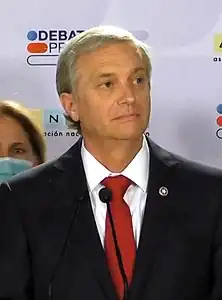2025 Chilean general election
General elections are constitutionally mandated to be held in Chile every four years to elect members of the National Congress and the president. Incumbent president Gabriel Boric is ineligible to seek a second consecutive term according to the 1980 constitution.
|
| |||
Presidential election | |||
| |||
|
| |||
| |||
Background
In the 2021 general elections Gabriel Boric defeated lawyer and politician José Antonio Kast, capitalizing on youth disenchantment, anger at former President Sebastian Pinera's term, and a slowing economy in the aftermath of the COVID-19 pandemic.[1] Originally a student protest leader during the 2011–2013 Chilean student protests, Boric promised to “leave behind once and for all the patriarchal inheritance of our society,” and take Chile in a more inclusive, progressive direction.[2] Upon his victory, Boric added that Chile under his leadership "needs transparent accounts, an orderly economy, because otherwise reforms we do can wind up being reversed."[3]
Since becoming President, Boric's government, where more than half of his cabinet are women,[4] has prioritized pension reform,[5] his proposals to nationalize lithium mining,[6] attempt to enact gun control measures,[7] expand LGBT rights in Chile,[8] progressive tax reforms,[9] and his government's efforts to approve a new Constitution.[10]
Since taking office, Boric has seen his approval ratings among voters decline significantly, to less than one-in-three approving of his performance. By May 2023 Boric's approval rating among the public was 28% and his disapproval rating was at 66%.[11][12] Boric's low approval ratings, combined with the Republican Party's victory in the 2023 Constitutional Council elections, and the rising popularity of Evelyn Matthei and José Antonio Kast in opinion polls, has led analysts to note Kast may make "further gains in the 2024 regional elections and place him as the front-runner for the 2025 presidential and parliamentary ballot."[13] Kast himself, considered to be a potential candidate in 2025, noted that his party's victory in the Constitutional Council elections, saying that there was hope for "a major change in government" ahead of the next general election.[14]
Electoral system
The President is elected using the two-round system; if no candidate receives a majority of the vote in the first round, a second round will be held.
In the National Congress, the 155 members of the Chamber of Deputies are elected from 28 multi-member constituencies with between three and eight seats by open list proportional representation. Seats are allocated by the d'Hondt method. The 50 members of the Senate are elected for eight-year terms, with around half of the Senators renewed at each general election. Senators are elected from 16 multi-member constituencies of between two and five seats based on the regions.[15]
Candidates
Speculated candidates
- Evelyn Matthei (Independent Democratic Union–Chile Vamos), Alcalde of Providencia[16]
- José Antonio Kast (Republican Party), Former member of the Chamber of Deputies from East Santiago[17]
- Camila Vallejo (Communist Party of Chile–Apruebo Dignidad), Minister General Secretariat of Government[18]
- Carolina Tohá (Party for Democracy–Democratic Socialism), Ministry of the Interior and Public Security (Chile)[18]
- Franco Parisi (Party of the People), business engineer[18]
- Rodolfo Carter (Independent Democratic Union–Chile Vamos) Alcalde of La Florida[18]
Opinion polls
References
- Bonnefoy, Pascale; Londoño, Ernesto (2021-12-19). "Gabriel Boric, a Former Student Activist, Is Elected Chile's Youngest President". The New York Times. ISSN 0362-4331. Retrieved 2023-07-17.
- "Leftist millennial vows to remake Chile after historic win". CNBC. 2021-12-20. Retrieved 2023-07-17.
- Cambero, Fabian; Esposito, Anthony; Miranda, Natalia A. Ramos (2021-12-20). "Chile's Boric pledges an orderly economy, swift naming of Cabinet". Reuters. Retrieved 2023-07-17.
- Bartlett, John (2022-01-21). "Chile's president-elect names progressive, majority-women cabinet". The Guardian. ISSN 0261-3077. Retrieved 2023-07-17.
- Funk, Robert L. (15 November 2022). "Chile's Pension Reform May Decide Boric's Fate". Americas Quarterly. Retrieved 2023-07-17.
- Villegas, Alexander; Scheyder, Ernest; Scheyder, Ernest (2023-04-21). "Chile plans to nationalize its vast lithium industry". Reuters. Retrieved 2023-07-17.
- "Chilean President wants full ban on gun ownership". MercoPress. Retrieved 2023-07-20.
- Guzmán, Esteban (2022-12-10). "Chilean government launches LGBTQ+ rights campaign". Los Angeles Blade: LGBTQ News, Rights, Politics, Entertainment. Retrieved 2023-07-20.
- "Chile's Boric to insist on shelved tax reform bill by end of July". Reuters. 2023-06-01. Retrieved 2023-07-17.
- "Chileans Reject New Constitution in Blow to Leftist Leader". Bloomberg.com. 2022-09-04. Retrieved 2023-07-17.
- Socrates, Tatiana (2023-06-26). "Approval of Boric drops to 28%, and 86% believe there is corruption in the Democracia Viva case (See the complete survey here)". BNN Breaking. Retrieved 2023-07-17.
- "Chile's President Boric Takes Another Blow to Popularity as Graft Accusations Hit Key Allies". Bloomberg.com. 2023-06-27. Retrieved 2023-07-17.
- Fuente, Antonieta de la (2023-05-09). "Explaining the rise of the far-right Republican Party in Chile". EL PAÍS English. Retrieved 2023-07-17.
- "Buenos Aires Times | Chile's far right re-emerges after presidential defeat". www.batimes.com.ar. Retrieved 2023-07-17.
- "Political structure". country.eiu.com. Retrieved 2023-07-17.
- Sweigart, Emilie (December 6, 2022). "The No-Nonsense Mayor Leading Chile's Right". Americas Quarterly. Retrieved 12 August 2023.
- "Boric's Lithium Strategy Will Hinder Chile's Growth, Conservative Rival Kast Says". Bloomberg.com. 2023-06-21. Retrieved 2023-07-17.
- "Pulso Ciudadano Marzo". Somos Activa. Retrieved 2023-07-17.
.jpg.webp)

.jpg.webp)

.png.webp)
](../I/Replace_this_image_male.svg.png.webp)